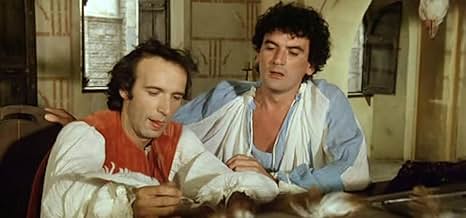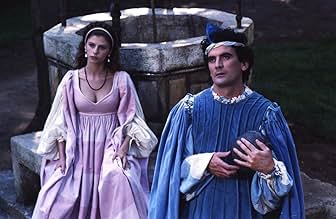Saverio e Mario, due amici per la pelle, si trovano con l'auto presso un passaggio a livello in aperta campagna. Data l'enorme attesa del treno, decidono di prendere una scorciatoia che li p... Leggi tuttoSaverio e Mario, due amici per la pelle, si trovano con l'auto presso un passaggio a livello in aperta campagna. Data l'enorme attesa del treno, decidono di prendere una scorciatoia che li porterà a smarrirsi , trovandosi così nel 1492....Saverio e Mario, due amici per la pelle, si trovano con l'auto presso un passaggio a livello in aperta campagna. Data l'enorme attesa del treno, decidono di prendere una scorciatoia che li porterà a smarrirsi , trovandosi così nel 1492....
- Regia
- Sceneggiatura
- Star
- Premi
- 1 candidatura in totale
Recensioni in evidenza
The couple shows great chemistry and is funny in every respect. The psychology of their characters is complex and credible - for once comical roles with a depth. Basically, Saverio is an embittered petit-bourgeois forever attracted and rejected by women, envious of Mario, an easy-going proletarian every woman falls in love with. Saverio is scheming, mean and vindictive as much as Mario is naive, generous and forgiving. What a match of talents: Roberto Benigni and Massimo Troisi at the peak of combined creativity. Too bad they will never come back together for another joint venture. Or maybe it is better this way: masterpieces of this level cannot be improved on, at best they can be imitated. For this reason Non ci resta che piangere will shine like a gem in the crown of the best Italian movies of all times. Sadly not many people seem to have seen it, not even in Italy, where the viewers do not need subtitles to enjoy the hilarious juggling of the two actors with the language, but their body language can be universally appreciated.
If you miss it you will have to repent!
Settled in the italian reinassance, pretty well depicted despite the low budget used, the movie is substantially a collection of sketches based on the struggles that the two men must fight against the different lifestyle, with some secondary stories based on historical personages lived in that time (Savonarola, Columbus, Da Vinci). This is one of the most beloved italian movie of all the times, and everybody saw this movie can remember all of the most famous dialogues (Vitellozzo after the death of his brother, the "remember that you shall die!" speech, the scene at the customs, and many others) by hearth, as they were funny and innovative.
Directed with a very slow rhythm, that adds a quite poetic touch to the story, this movie must be considered as a small masterpiece, a comedy unique of its kind. Comparing this with one of the later italian comedy should be done to understand the meaning of the term "good taste".
Unluckily, anybody without a very fluent italian can't completely enjoy this movie, because a big part of the funny side of this movie follows from the two heavy accents of the two main actors, mainly the one of Troisi.
The humor is unequal, though, some things are really funny, while most of the movie felt boring. The low budget Italian film feeling also didn't help, reminding me of those horrible "Princess dresses in boy's clothes and saves her magical cardboard kingdom" films, if you know what I mean.
The movie was recommended by an Italian friend of mine, and he is not stupid, so maybe being Italian helps a lot with this film.
Lo sapevi?
- QuizThe screenplay is the main guideline for the film but many dialogues were improvised by Troisi and Benigni.
- Citazioni
[last lines]
Saverio: Look! A train! I told you we would return to the present!
Mario: I'm not marrying Gabriellina!
Saverio: Oh yes you are!
Leonardo da Vinci: Engineers! TRAIN!
Leonardo da Vinci: For God's sake! 33%... 33%... and 33%...
[cut to a shot of the train and freeze as the film ends]
- ConnessioniEdited into Bellissimo: Immagini del cinema italiano (1985)
- Colonne sonoreNel blu dipinto di blu
Written by Domenico Modugno and Franco Migliacci
I più visti
- How long is Nothing Left to Do but Cry?Powered by Alexa
Dettagli
Contribuisci a questa pagina

























